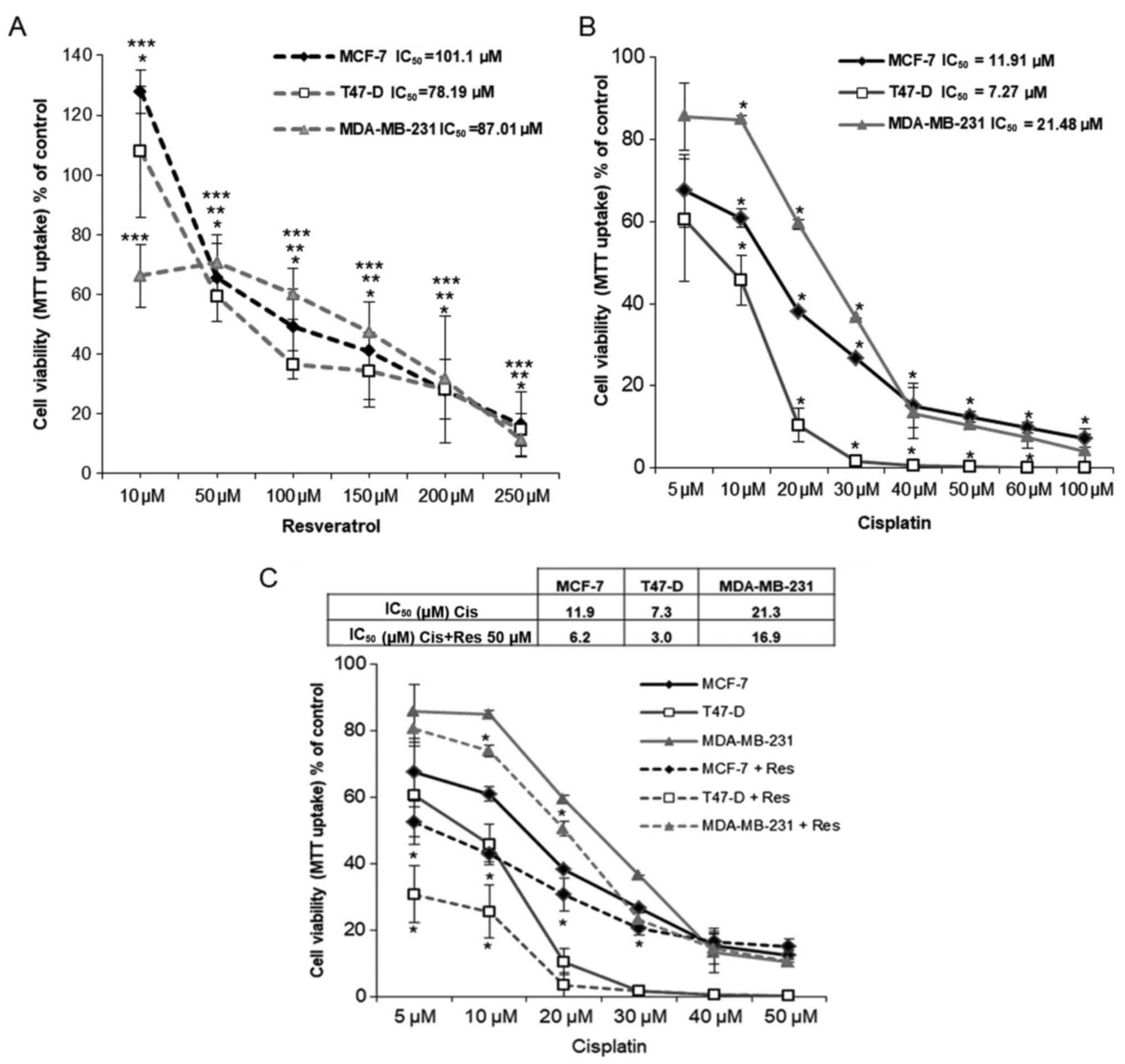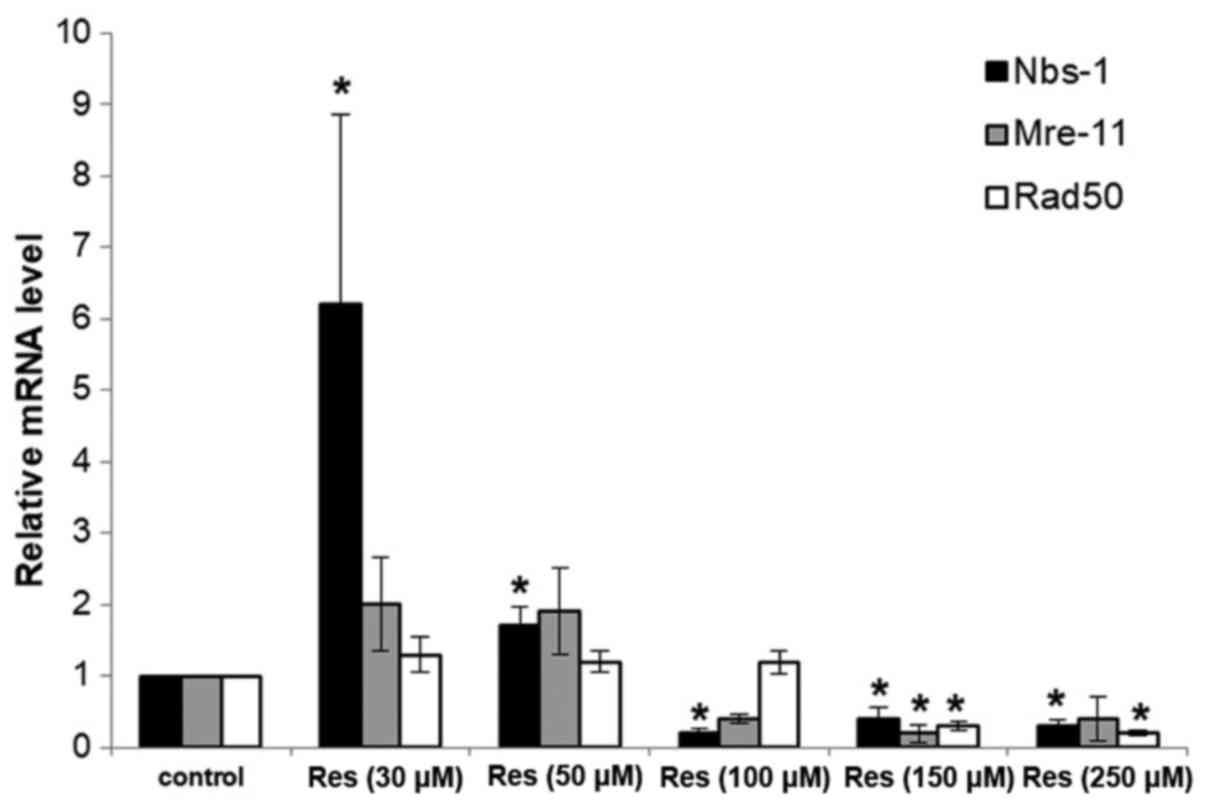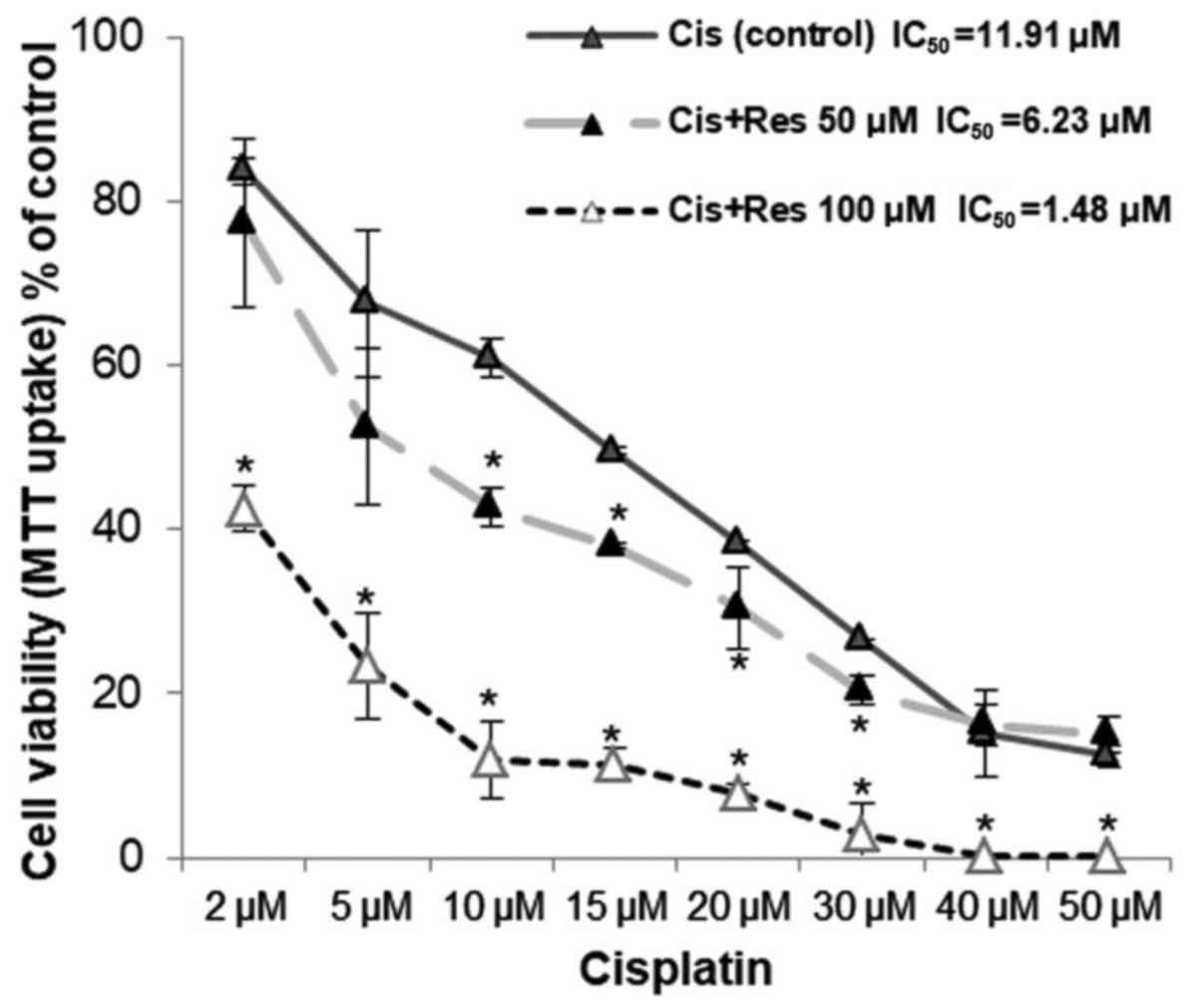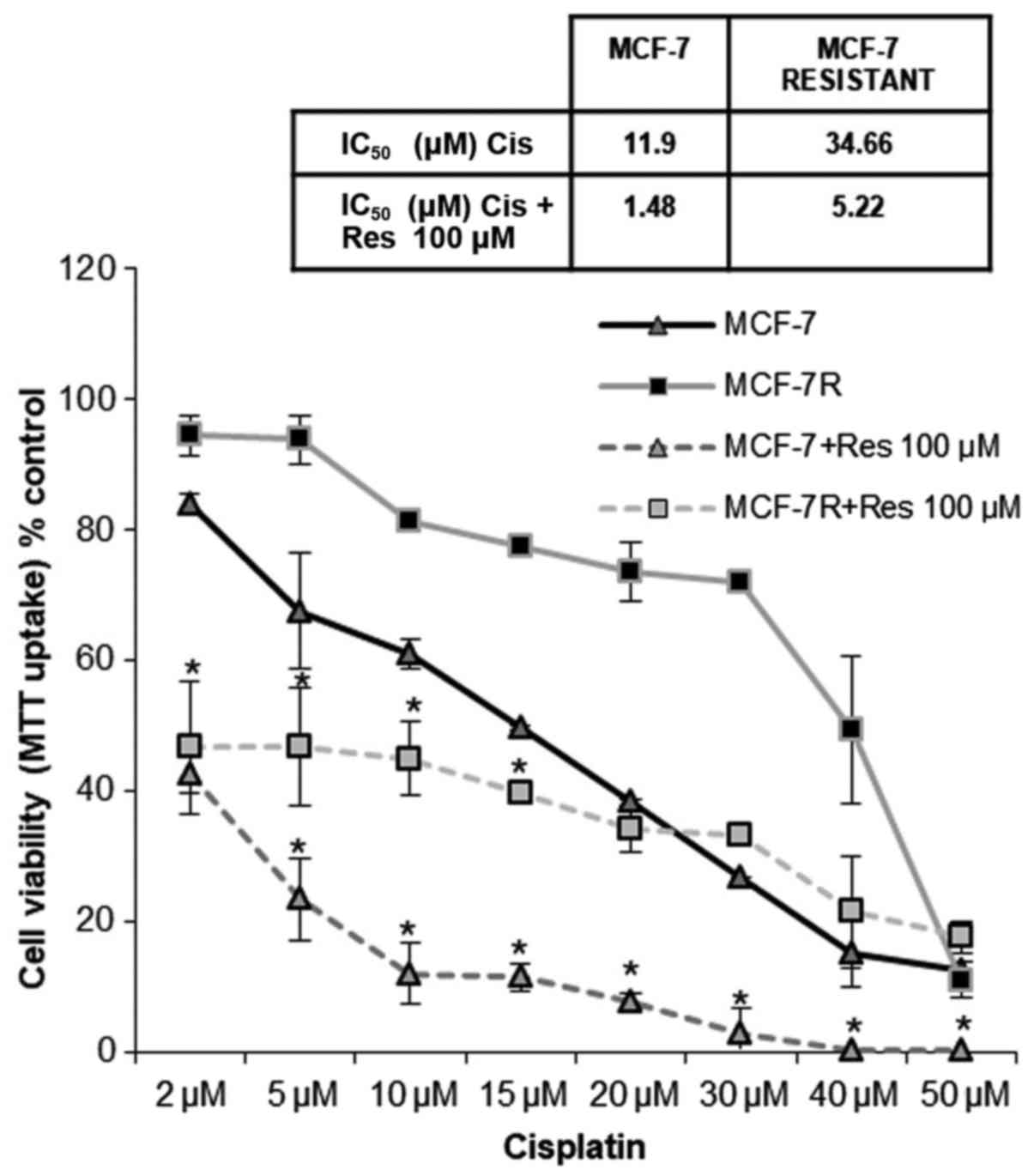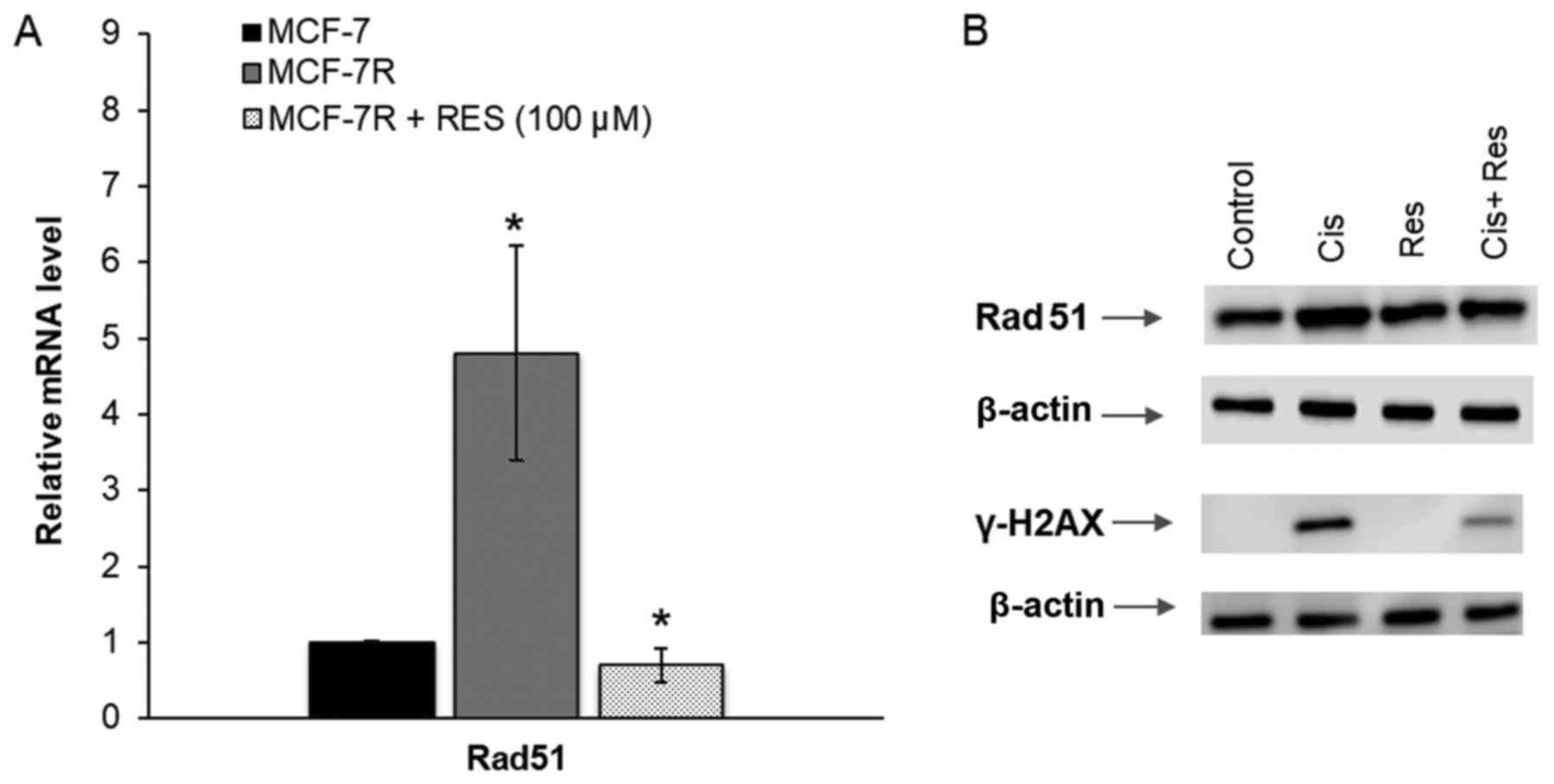|
1
|
Hoeijmakers JH: Genome maintenance
mechanisms for preventing cancer. Nature. 411:366–374. 2001.
View Article : Google Scholar
|
|
2
|
Chaney SG and Sancar A: DNA repair:
Enzymatic mechanisms and relevance to drug response. J Natl Cancer
Inst. 88:1346–1360. 1996. View Article : Google Scholar
|
|
3
|
Panasci L, Paiement JP, Christodoulopoulos
G, Belenkov A, Malapetsa A and Aloyz R: Chlorambucil drug
resistance in chronic lymphocytic leukemia: The emerging role of
DNA repair. Clin Cancer Res. 7:454–461. 2001.
|
|
4
|
Monneret C: Platinum anticancer drugs.
From serendipity to rational design. Ann Pharm Fr. 69:286–295.
2011. View Article : Google Scholar
|
|
5
|
Shen DW, Pouliot LM, Hall MD and Gottesman
MM: Cisplatin resistance: A cellular self-defense mechanism
resulting from multiple epigenetic and genetic changes. Pharmacol
Rev. 64:706–721. 2012. View Article : Google Scholar
|
|
6
|
Stewart DJ: Mechanisms of resistance to
cisplatin and carboplatin. Crit Rev Oncol Hematol. 63:12–31. 2007.
View Article : Google Scholar
|
|
7
|
Martin LP, Hamilton TC and Schilder RJ:
Platinum resistance: The role of DNA repair pathways. Clin Cancer
Res. 14:1291–1295. 2008. View Article : Google Scholar
|
|
8
|
Wang ZM, Chen ZP, Xu ZY,
Christodoulopoulos G, Bello V, Mohr G, Aloyz R and Panasci LC: In
vitro evidence for homologous recombinational repair in resistance
to melphalan. J Natl Cancer Inst. 93:1473–1478. 2001. View Article : Google Scholar
|
|
9
|
Choudhury A, Zhao H, Jalali F, Al Rashid
S, Ran J, Supiot S, Kiltie AE and Bristow RG: Targeting homologous
recombination using imatinib results in enhanced tumor cell
chemosensitivity and radiosensitivity. Mol Cancer Ther. 8:203–213.
2009. View Article : Google Scholar
|
|
10
|
Ko JC, Ciou SC, Cheng CM, Wang LH, Hong
JH, Jheng MY, Ling ST, Lin YW, Ko JC, Ciou SC, et al: Involvement
of Rad51 in cytotoxicity induced by epidermal growth factor
receptor inhibitor (gefitinib, IressaR) and chemotherapeutic agents
in human lung cancer cells. Carcinogenesis. 29:1448–1458. 2008.
View Article : Google Scholar
|
|
11
|
Tsai MS, Kuo YH, Chiu YF, Su YC and Lin
YW: Down-regulation of Rad51 expression overcomes drug resistance
to gemcitabine in human non-small-cell lung cancer cells. J
Pharmacol Exp Ther. 335:830–840. 2010. View Article : Google Scholar
|
|
12
|
Chen RS, Jhan JY, Su YJ, Lee WT, Cheng CM,
Ciou SC, Lin ST, Chuang SM, Ko JC and Lin YW: Emodin enhances
gefitinib-induced cytotoxicity via Rad51 downregulation and ERK1/2
inactivation. Exp Cell Res. 315:2658–2672. 2009. View Article : Google Scholar
|
|
13
|
Javvadi P, Segan AT, Tuttle SW and
Koumenis C: The chemopreventive agent curcumin is a potent
radiosensitizer of human cervical tumor cells via increased
reactive oxygen species production and overactivation of the
mitogen-activated protein kinase pathway. Mol Pharmacol.
73:1491–1501. 2008. View Article : Google Scholar
|
|
14
|
Ko JC, Su YJ, Lin ST, Jhan JY, Ciou SC,
Cheng CM and Lin YW: Suppression of ERCC1 and Rad51 expression
through ERK1/2 inactivation is essential in emodin-mediated
cytotoxicity in human non-small cell lung cancer cells. Biochem
Pharmacol. 79:655–664. 2010. View Article : Google Scholar
|
|
15
|
Fremont L: Biological effects of
resveratrol. Life Sci. 66:663–673. 2000. View Article : Google Scholar
|
|
16
|
Sanders TH, McMichael RW Jr and Hendrix
KW: Occurrence of resveratrol in edible peanuts. J Agric Food Chem.
48:1243–1246. 2000. View Article : Google Scholar
|
|
17
|
Sobolev VS and Cole RJ: Trans-resveratrol
content in commercial peanuts and peanut products. J Agric Food
Chem. 47:1435–1439. 1999. View Article : Google Scholar
|
|
18
|
Bianchini F and Vainio H: Wine and
resveratrol: Mechanisms of cancer prevention? Eur J Cancer Prev.
12:417–425. 2003. View Article : Google Scholar
|
|
19
|
Borriello A, Bencivenga D, Caldarelli I,
Tramontano A, Borgia A, Zappia V and Della Ragione F: Resveratrol:
From basic studies to bedside. Cancer Treat Res. 159:167–184. 2014.
View Article : Google Scholar
|
|
20
|
Leon-Galicia I, Diaz-Chavez J,
Garcia-Villa E, Uribe-Figueroa L, Hidalgo-Miranda A, Herrera LA,
Alvarez-Rios E, Garcia-Mena J and Gariglio P: Resveratrol induces
downregulation of DNA repair genes in MCF-7 human breast cancer
cells. Eur J Cancer Prev. 22:11–20. 2013. View Article : Google Scholar
|
|
21
|
Yalcin A: Quantification of thioredoxin
mRNA expression in the rat hippocampus by real-time PCR following
oxidative stress. Acta Biochim Pol. 51:1059–1065. 2004.
|
|
22
|
Livak KJ and Schmittgen TD: Analysis of
relative gene expression data using real-time quantitative PCR and
the 2−ΔΔCT method. Methods. 25:402–408. 2001.
View Article : Google Scholar
|
|
23
|
Mao Z, Jiang Y, Liu X, Seluanov A and
Gorbunova V: DNA repair by homologous recombination, but not by
nonhomologous end joining, is elevated in breast cancer cells.
Neoplasia. 11:683–691. 2009. View Article : Google Scholar
|
|
24
|
Christodoulopoulos G, Malapetsa A,
Schipper H, Golub E, Radding C and Panasci LC: Chlorambucil
induction of HsRad51 in B-cell chronic lymphocytic leukemia. Clin
Cancer Res. 5:2178–2184. 1999.
|
|
25
|
Hine CM, Seluanov A and Gorbunova V: Use
of the Rad51 promoter for targeted anti-cancer therapy. Proc Natl
Acad Sci USA. 105:20810–20815. 2008. View Article : Google Scholar
|
|
26
|
Maacke H, Hundertmark C, Miska S, Voss M,
Kalthoff H and Sturzbecher HW: Autoantibodies in sera of pancreatic
cancer patients identify recombination factor Rad51 as a
tumour-associated antigen. J Cancer Res Clin Oncol. 128:219–222.
2002. View Article : Google Scholar
|
|
27
|
Richardson C: RAD51, genomic stability,
and tumorigenesis. Cancer Lett. 218:127–139. 2005. View Article : Google Scholar
|
|
28
|
Clingen PH, Wu JY, Miller J, Mistry N,
Chin F, Wynne P, Prise KM and Hartley JA: Histone H2AX
phosphorylation as a molecular pharmacological marker for DNA
interstrand crosslink cancer chemotherapy. Biochem Pharmacol.
76:19–27. 2008. View Article : Google Scholar
|
|
29
|
Suwaki N, Klare K and Tarsounas M: RAD51
paralogs: Roles in DNA damage signalling, recombinational repair
and tumorigenesis. Semin Cell Dev Biol. 22:898–905. 2011.
View Article : Google Scholar
|
|
30
|
Hussain SA, Sulaiman AA, Balch C, Chauhan
H, Alhadidi QM and Tiwari AK: Natural polyphenols in cancer
chemoresistance. Nutr Cancer. 68:879–891. 2016. View Article : Google Scholar
|
|
31
|
Mao QQ, Bai Y, Lin YW, Zheng XY, Qin J,
Yang K and Xie LP: Resveratrol confers resistance against taxol via
induction of cell cycle arrest in human cancer cell lines. Mol Nutr
Food Res. 54:1574–1584. 2010. View Article : Google Scholar
|
|
32
|
Vanamala J, Reddivari L, Radhakrishnan S
and Tarver C: Resveratrol suppresses IGF-1 induced human colon
cancer cell proliferation and elevates apoptosis via suppression of
IGF-1R/Wnt and activation of p53 signaling pathways. BMC Cancer.
10:2382010. View Article : Google Scholar
|
|
33
|
Liu PL, Tsai JR, Charles AL, Hwang JJ,
Chou SH, Ping YH, Lin FY, Chen YL, Hung CY, Chen WC, et al:
Resveratrol inhibits human lung adenocarcinoma cell metastasis by
suppressing heme oxygenase 1-mediated nuclear factor-kappaB pathway
and subsequently downregulating expression of matrix
metalloproteinases. Mol Nutr Food Res. 2:S196–S204. 2010.
View Article : Google Scholar
|
|
34
|
Kraft TE, Parisotto D, Schempp C and
Efferth T: Fighting cancer with red wine? Molecular mechanisms of
resveratrol. Crit Rev Food Sci Nutr. 49:782–799. 2009. View Article : Google Scholar
|
|
35
|
Kelley MR, Logsdon D and Fishel ML:
Targeting DNA repair pathways for cancer treatment: What's new?
Future Oncol. 10:1215–1237. 2014. View Article : Google Scholar
|
|
36
|
Bouwman P and Jonkers J: The effects of
deregulated DNA damage signalling on cancer chemotherapy response
and resistance. Natu Rev Cancer. 12:587–598. 2012. View Article : Google Scholar
|
|
37
|
Bhattacharyya A, Ear US, Koller BH,
Weichselbaum RR and Bishop DK: The breast cancer susceptibility
gene BRCA1 is required for subnuclear assembly of Rad51 and
survival following treatment with the DNA cross-linking agent
cisplatin. J Biol Chem. 275:23899–23903. 2000. View Article : Google Scholar
|
|
38
|
Farmer H, McCabe N, Lord CJ, Tutt AN,
Johnson DA, Richardson TB, Santarosa M, Dillon KJ, Hickson I,
Knights C, et al: Targeting the DNA repair defect in BRCA mutant
cells as a therapeutic strategy. Nature. 434:917–921. 2005.
View Article : Google Scholar
|
|
39
|
Hannay JA, Liu J, Zhu QS, Bolshakov SV, Li
L, Pisters PW, Lazar AJ, Yu D, Pollock RE and Lev D: Rad51
overexpression contributes to chemoresistance in human soft tissue
sarcoma cells: A role for p53/activator protein 2 transcriptional
regulation. Mol Cancer Ther. 6:1650–1660. 2007. View Article : Google Scholar
|
|
40
|
Slupianek A, Schmutte C, Tombline G,
Nieborowska-Skorska M, Hoser G, Nowicki MO, Pierce AJ, Fishel R and
Skorski T: BCR/ABL regulates mammalian RecA homologs, resulting in
drug resistance. Mol Cell. 8:795–806. 2001. View Article : Google Scholar
|
|
41
|
Russell JS, Brady K, Burgan WE, Cerra MA,
Oswald KA, Camphausen K and Tofilon PJ: Gleevec-mediated inhibition
of Rad51 expression and enhancement of tumor cell radiosensitivity.
Cancer Res. 63:7377–7383. 2003.
|
|
42
|
Adimoolam S, Sirisawad M, Chen J, Thiemann
P, Ford JM and Buggy JJ: HDAC inhibitor PCI-24781 decreases RAD51
expression and inhibits homologous recombination. Proc Natl Acad
Sci USA. 104:19482–19487. 2007. View Article : Google Scholar
|
|
43
|
Shirode AB, Kovvuru P, Chittur SV, Henning
SM, Heber D and Reliene R: Antiproliferative effects of pomegranate
extract in MCF-7 breast cancer cells are associated with reduced
DNA repair gene expression and induction of double strand breaks.
Mol Carcinog. 53:458–470. 2014. View Article : Google Scholar
|
|
44
|
Sharma P, McClees SF and Afaq F:
Pomegranate for prevention and treatment of cancer: An update.
Molecules. 22:E1772017. View Article : Google Scholar
|
|
45
|
Le Corre L, Fustier P, Chalabi N, Bignon
YJ and Bernard-Gallon D: Effects of resveratrol on the expression
of a panel of genes interacting with the BRCA1
oncosuppressor in human breast cell lines. Clin Chim Acta.
344:115–121. 2004. View Article : Google Scholar
|
|
46
|
Meng J, Guo F, Xu H, Liang W, Wang C and
Yang XD: Combination therapy using Co-encapsulated resveratrol and
paclitaxel in liposomes for drug resistance reversal in breast
cancer cells in vivo. Sci Rep. 6:223902016. View Article : Google Scholar
|
|
47
|
Ruivo J, Francisco C, Oliveira R and
Figueiras A: The main potentialities of resveratrol for drug
delivery systems. Braz J Pharm Sci. 51:499–513. 2015. View Article : Google Scholar
|
|
48
|
Singh G and Pai RS: Trans-resveratrol
self-nano-emulsifying drug delivery system (SNEDDS) with enhanced
bioavailability potential: Optimization, pharmacokinetics and in
situ single pass intestinal perfusion (SPIP) studies. Drug Deliv.
22:522–530. 2015. View Article : Google Scholar
|
|
49
|
Smoliga JM and Blanchard O: Enhancing the
delivery of resveratrol in humans: If low bioavailability is the
problem, what is the solution? Molecules. 19:17154–17172. 2014.
View Article : Google Scholar
|
|
50
|
Uberti F, Morsanuto V, Aprile S, Ghirlanda
S, Stoppa I, Cochis A, Grosa G, Rimondini L and Molinari C:
Biological effects of combined resveratrol and vitamin D3 on
ovarian tissue. J Ovarian Res. 10:612017. View Article : Google Scholar
|
|
51
|
Johnson JJ, Nihal M, Siddiqui IA, Scarlett
CO, Bailey HH, Mukhtar H and Ahmad N: Enhancing the bioavailability
of resveratrol by combining it with piperine. Mol Nutr Food Res.
55:1169–1176. 2011. View Article : Google Scholar
|
|
52
|
Frozza RL, Bernardi A, Paese K, Hoppe JB,
da Silva T, Battastini AM, Pohlmann AR, Guterres SS and Salbego C:
Characterization of trans-resveratrol-loaded lipid-core
nanocapsules and tissue distribution studies in rats. J Biomed
Nanotechnol. 6:694–703. 2010. View Article : Google Scholar
|
|
53
|
Androutsopoulos VP, Fragiadaki I,
Spandidos DA and Tosca A: The resveratrol analogue,
3,4,5,4′trans-tetramethoxystilbene, inhibits the growth of A375
melanoma cells through multiple anticancer modes of action. Int J
Oncol. 49:1305–1314. 2016. View Article : Google Scholar
|
|
54
|
Androutsopoulos VP, Fragiadaki I and Tosca
A: Activation of ERK1/2 is required for the antimitotic activity of
the resveratrol analogue 3,4,5,4′-tetramethoxystilbene (DMU-212) in
human melanoma cells. Exp Dermatol. 24:632–634. 2015. View Article : Google Scholar
|
|
55
|
Androutsopoulos VP, Ruparelia KC,
Papakyriakou A, Filippakis H, Tsatsakis AM and Spandidos DA:
Anticancer effects of the metabolic products of the resveratrol
analogue, DMU-212: Atructural requirements for potency. Eur J Med
Chem. 46:2586–2595. 2011. View Article : Google Scholar
|
|
56
|
Sale S, Verschoyle RD, Boocock D, Jones
DJ, Wilsher N, Ruparelia KC, Potter GA, Farmer PB, Steward WP and
Gescher AJ: Pharmacokinetics in mice and growth-inhibitory
properties of the putative cancer chemopreventive agent resveratrol
and the synthetic analogue trans 3,4,5,4′-tetramethoxystilbene. Br
J Cancer. 90:736–744. 2004. View Article : Google Scholar
|
|
57
|
Canpolat C, Pearson P and Jaffe N:
Cisplatin-associated hemolytic uremic syndrome. Cancer.
74:3059–3062. 1994. View Article : Google Scholar
|
|
58
|
Loehrer PJ and Einhorn LH: Drugs five
years later. Cisplatin. Ann Intern Med. 100:704–713. 1984.
View Article : Google Scholar
|
|
59
|
Dasari S and Tchounwou PB: Cisplatin in
cancer therapy: Molecular mechanisms of action. Eur J Pharmacol.
740:364–378. 2014. View Article : Google Scholar
|
|
60
|
Osman AM, Telity SA, Damanhouri ZA,
Al-Harthy SE, Al-Kreathy HM, Ramadan WS, Elshal MF, Khan LM and
Kamel F: Chemosensitizing and nephroprotective effect of
resveratrol in cisplatin -treated animals. Cancer Cell Int.
15:62015. View Article : Google Scholar
|
|
61
|
Valentovic MA, Ball JG, Brown JM, Terneus
MV, McQuade E, Van Meter S, Hedrick HM, Roy AA and Williams T:
Resveratrol attenuates cisplatin renal cortical cytotoxicity by
modifying oxidative stress. Toxicol In Vitro. 28:248–257. 2014.
View Article : Google Scholar
|
|
62
|
Patel KR, Brown VA, Jones DJ, Britton RG,
Hemingway D, Miller AS, West KP, Booth TD, Perloff M, Crowell JA,
et al: Clinical pharmacology of resveratrol and its metabolites in
colorectal cancer patients. Cancer Res. 70:7392–7399. 2010.
View Article : Google Scholar
|
|
63
|
Helleday T: Homologous recombination in
cancer development, treatment and development of drug resistance.
Carcinogenesis. 31:955–960. 2010. View Article : Google Scholar
|
|
64
|
Quiros S, Roos WP and Kaina B: Rad51 and
BRCA2 - New molecular targets for sensitizing glioma cells to
alkylating anticancer drugs. PLoS One. 6:e271832011. View Article : Google Scholar
|
|
65
|
Phuah NH and Nagoor NH: Regulation of
microRNAs by natural agents: New strategies in cancer therapies.
Biomed Res Int. 2014:8045102014. View Article : Google Scholar
|
|
66
|
Riffo-Campos AL, Riquelme I and
Brebi-Mieville P: Tools for sequence-based miRNA target prediction:
What to choose? Int J Mol Sci. 17:2016. View Article : Google Scholar
|
|
67
|
Wang Y, Huang JW, Calses P, Kemp CJ and
Taniguchi T: MiR-96 downregulates REV1 and RAD51 to promote
cellular sensitivity to cisplatin and PARP inhibition. Cancer Res.
72:4037–4046. 2012. View Article : Google Scholar
|















